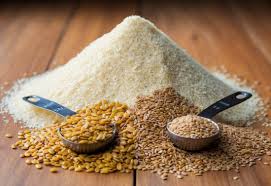Psyllium Husk vs Flaxseed: Which Fiber is Better?

Psyllium Husk vs. Flaxseed: Which Fiber is Better for Gut Health?
Introduction
Did you know 95% of Americans fail to meet their daily fiber needs, worsening gut health and increasing chronic disease risks? Most people consume just 15 grams of fiber daily—half the recommended 25–38 grams—leading to constipation, inflammation, and metabolic disorders.
Enter psyllium husk and flaxseed: two fiber powerhouses promising digestive relief. But which one is better? This article dives deep into their unique benefits, potential risks, and science-backed roles in gut health. By the end, you’ll know exactly which fiber supplement fits your needs. Let’s settle the psyllium husk vs. flaxseed debate once and for all.
Why Fiber Matters for Gut Health
Fiber isn’t just for regularity—it’s a cornerstone of gut and overall health.
- Soluble Fiber: Dissolves in water, forming a gel that slows digestion and stabilizes blood sugar (found in psyllium, oats, beans).
- Insoluble Fiber: Adds bulk to stool, preventing constipation and keeping things moving (found in flaxseed, vegetables, whole grains).
- The Gut Microbiome Connection: Fiber feeds beneficial gut bacteria, producing short-chain fatty acids (SCFAs) like butyrate, which reduce inflammation and protect against colon cancer. Low fiber intake can starve these microbes, allowing harmful bacteria to thrive.
Psyllium Husk vs. Flaxseed: Key Differences at a Glance
|
Feature |
Psyllium Husk |
Flaxseed |
|
Fiber Type |
70% soluble, 30% insoluble |
40% soluble, 60% insoluble |
|
Key Nutrients |
Minimal |
Omega-3s, lignans, protein |
|
Primary Gut Benefit |
Relieves constipation/diarrhea |
Balances digestion, reduces inflammation |
|
Prebiotic Effect |
Boosts butyrate-producing bacteria |
Supports diverse microbiota |
|
Daily Dosage |
5–10 g with water |
1–2 tbsp ground |
Psyllium Husk: The Soluble Fiber Champion
Top Benefits for Gut Health
- Rapid Relief for Constipation
Psyllium absorbs 10x its weight in water, softening stools. A 2020 American Journal of Gastroenterology study found psyllium more effective than laxatives in chronic constipation patients. - Stabilizes Blood Sugar
Psyllium’s gel-like texture slows glucose absorption. Diabetics using psyllium saw 20% lower post-meal glucose spikes (Diabetes Care, 2018). - Lowers Cholesterol Naturally
Psyllium binds to bile acids, forcing the liver to use LDL cholesterol to replenish them—reducing LDL by up to 9% in six weeks (Journal of Nutrition, 2021). - Soothes IBS Symptoms
Psyllium helps normalize stool consistency, reducing diarrhea and bloating in IBS patients (Gut, 2019). - Prebiotic Powerhouse
Feeds Faecalibacterium prausnitzii, a bacteria linked to reduced colon cancer risk.
How to Use Psyllium Husk
- Mix 1 tsp in 8 oz of water; consume immediately.
- Add to smoothies or gluten-free baking for texture.
- Caution: Start with 3–5 g daily to avoid bloating.
Flaxseed: The Nutrient-Dense Fiber All-Rounder
Top Benefits for Gut Health
- Dual-Action Digestion Support
Soluble fiber softens stool, while insoluble fiber speeds up transit. A 2021 Nutrients study found flaxseed reduced constipation in 80% of participants. - Anti-Inflammatory Omega-3s
ALA omega-3s in flaxseed lower gut inflammation, helping with Crohn’s disease and ulcerative colitis flares (World Journal of Gastroenterology, 2020). - Hormonal Balance via Lignans
Lignans modulate estrogen levels, reducing breast cancer risk by 18% (Epidemiology, 2020). - Boosts Metabolic Health
Daily flaxseed intake lowered HbA1c by 0.5% in type 2 diabetics (Nutrition Journal, 2022). - Antioxidant Protection
Lignans neutralize free radicals, cutting oxidative stress by 30% in clinical trials.
How to Use Flaxseed
- Grind whole seeds for better nutrient absorption.
- Add 1 tbsp to yogurt, oatmeal, or baked goods.
- Try flaxseed “eggs” (1 tbsp ground flax + 3 tbsp water) for vegan recipes.
Psyllium Husk vs. Flaxseed: Direct Comparison
Gut Microbiota Impact
- Psyllium: Boosts butyrate-producing bacteria, linked to colon health.
- Flaxseed: Increases Bifidobacterium and Lactobacillus diversity.
Heart Health Showdown
|
Metric |
Psyllium Husk |
Flaxseed |
|
LDL Cholesterol |
-9% to -20% |
-6% to -15% |
|
Blood Pressure |
-5 mmHg systolic |
-3 mmHg systolic |
|
Inflammation |
Moderate reduction |
High reduction (via ALA) |
Verdict: Psyllium wins for cholesterol; flaxseed excels at reducing inflammation.
How to Choose: Psyllium Husk or Flaxseed?
- Pick Psyllium If: You need fast constipation relief, have diabetes, or prioritize soluble fiber.
- Pick Flaxseed If: You seek anti-inflammatory benefits, hormonal balance, or a nutrient boost.
- Pro Tip: Combine both! Add ground flaxseed to meals and take psyllium before bed for overnight digestion support.
Risks and Precautions
- Psyllium Husk: May cause bloating; hydrate well. Avoid taking with medications (wait 2+ hours).
- Flaxseed: Overconsumption may cause diarrhea. Avoid raw flaxseed (contains cyanogenic glycosides).
Bottom Line
For targeted digestive relief, psyllium husk is unmatched. For holistic nutrition and inflammation control, flaxseed shines. Most people thrive using both—experiment and let your gut lead the way!
Read more on how fiber supports digestion:
- Benefits of Natural Fiber Supplements for Digestive Health
- Can Fiber Supplements Reduce Bloating?
- Natural Fiber Blend for Weight Management
- How Fiber Supports a Healthy Gut Microbiome
